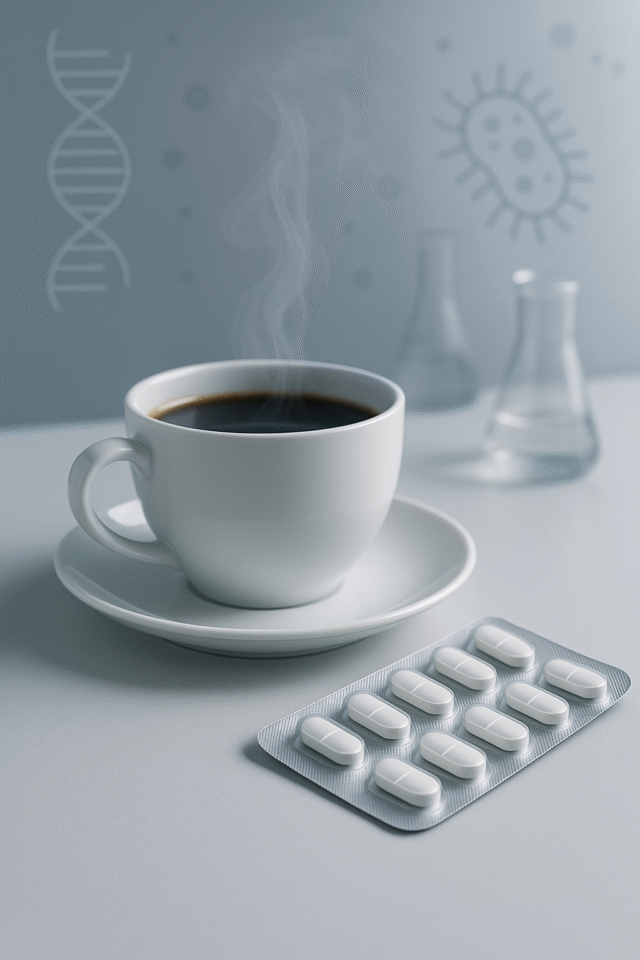Dubai, 25 August 2025 (Qahwa World) – Coffee has long been celebrated as a daily ritual for millions, a comforting beverage that fuels mornings and punctuates workdays. Yet new scientific findings are shedding light on a potential downside that coffee drinkers might not expect: its ability to interfere with the effectiveness of certain antibiotics. According to a groundbreaking study recently published in the journal PLOS Biology, caffeine can alter how bacteria respond to some widely used antibiotics, raising concerns about the hidden influence of everyday dietary habits on medical treatments.
The study was conducted by an international team of researchers who set out to better understand how chemical substances affect the ability of bacteria to regulate what moves in and out of their cells. The focus was on Escherichia coli (E. coli), a bacterium commonly found in the human gut but also responsible for a range of infections from urinary tract infections to bloodstream infections. The scientists tested ninety-four different chemical substances and tracked their impact on bacterial transport systems, which function like cellular gates. Around a third of these substances were shown to disrupt genetic activity linked to transport, but one stood out more than any other: caffeine. When caffeine was introduced, E. coli absorbed noticeably lower amounts of certain antibiotics, most notably ciprofloxacin and amoxicillin, two drugs frequently prescribed around the world.
The mechanism behind this surprising effect turned out to be more complex than a simple blockage. At the center of the process was a regulatory protein called Rob, which the researchers discovered played a far larger role in bacterial survival than previously understood. Rob controlled about a third of all the transcriptional changes triggered by the different chemicals in the study. When caffeine entered the system, it activated Rob, which in turn stimulated the expression of a small RNA molecule known as MicF. This RNA molecule suppressed the production of OmpF, a porin protein in the outer membrane of E. coli. OmpF normally acts as an open gate, allowing substances, including antibiotics, to flow into the bacterial cell. By shutting down OmpF production, the bacteria effectively reduced the uptake of antibiotics, leaving the drugs less effective.
Researchers confirmed this effect through checkerboard assays, a method of testing drug interactions that involves exposing bacteria to different concentrations of antibiotics in the presence of caffeine. The results showed that the bacteria required higher doses of antibiotics to achieve the same level of inhibition once caffeine was present. This is a classic example of what scientists call low-level antibiotic resistance. It is not the dramatic, full-scale resistance that has become a global health crisis, where bacteria acquire mutations that allow them to permanently survive treatment. Instead, it is a subtler, temporary effect triggered by environmental changes and chemical exposures. These adaptations may not fully defeat antibiotics, but they can weaken their effectiveness and complicate treatment strategies.
Importantly, the weakening effect of caffeine was not observed in all bacteria. When the same experiments were carried out on Salmonella enterica, a pathogen closely related to E. coli, caffeine showed no influence on antibiotic absorption. This suggests that the response is species-specific and highlights how much remains unknown about the interaction between bacteria, antibiotics, and common dietary substances.
The authors of the study caution that these results were obtained under controlled laboratory conditions. At this stage, it is not possible to say how much coffee a person would need to drink to cause noticeable effects while taking antibiotics, or whether these findings translate directly to human patients. However, the researchers argue that the implications are serious enough to warrant further investigation. Even small shifts in antibiotic uptake could make infections harder to treat, particularly at a time when the medical community is racing to address the growing threat of antibiotic resistance worldwide.
Coffee has already been linked in past research to the way the body metabolizes certain medications, including drugs for high blood pressure and depression. The new findings extend this conversation to antibiotics, suggesting that caffeine’s influence reaches beyond human metabolism and into the bacterial world itself. As microbiologist Christoph Binsfeld of the University of Würzburg noted, substances like caffeine can “subtly but systematically” influence bacterial gene regulation, and mapping these mechanisms will be crucial for ensuring that antibiotics remain effective tools in modern medicine.
For coffee lovers, the message is not one of alarm but of awareness. More research will be needed to determine whether drinking coffee while on antibiotics has real-world clinical consequences. Until then, the study serves as a reminder that the foods and drinks we consume can interact with medical treatments in unexpected ways. With antibiotic resistance already recognized by the World Health Organization as one of the most pressing threats to global health, even small lifestyle factors deserve careful attention. The simple act of sipping coffee may seem harmless, but as this study reveals, it could be part of a much more complex story of how microbes adapt, survive, and challenge the medicines designed to fight them.
